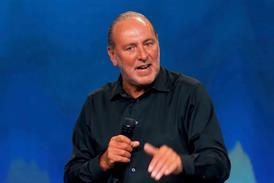The tide is turning on belief in God. There’s a growing interest in the Christian message, says Stephen McAlpine

“I want you to meet Claire,” my friend Ollie said to me at our annual church network celebration.
“She’s just become a Christian.”
A newbie! A recent convert! I was in! In this day and age, in which the tide of Christianity is going out – plummeting church attendance, general indifference on one hand, hostile anger on the other – just meeting a person who is positive towards the faith seems a long stretch. But someone who’s actually become a Christian? Crazy stuff!
Claire came over for chat. Not a university student. Not a recent migrant. Not someone in dire need. Claire was in her 40s, well educated, working in a creative industry, happily married with kids (the family had all turned up to the church despite only Claire being the one with faith).
In other words, Claire was the type of person we generally think doesn’t become a Christian in the West.
The kind of person we say “No” for, without even asking. We just assume that that’s the person for whom Christianity is no longer on the radar. She’s not the low-hanging fruit that we presume is all that is left.
Which is why my first reaction was one of excitement. I’ve fallen into that glass-half-empty way of thinking about Christianity’s future in the West as well.
Christianity in our part of the world is supposedly on the wane in terms of capturing the imagination of those who are seeking spiritual meaning. And let’s not even talk about the scandals, and the unseemly partnership with political power.
Yet here is Claire. And, from what I am hearing, quite a few people like her. For all of the energy put into the new atheism and the now-forgotten bus ads that said, “There’s probably no God”, it seems that people are hoping there might be! But even more: that God might have something to offer them.
You see, those atheist ads on buses failed to come to grips with the meaning crisis in the West. Remember what came after the assertion about there being no God? A command to stop worrying and enjoy your life!
Yet here we are, deep in the mire of a mental-health crisis in the West, with huge concerns – and conflicts – about what the meaning and purpose of life is. We have access to almost anything we want: the experience bucket is full. But the meaning and purpose bucket? Well, that’s draining pretty fast.
It turns out that when you remove God from the equation, something or someone else has to carry all of that weight. And nothing else seems to be doing that.
Of course, Christianity isn’t the only thing people are looking to for spiritual meaning. And technology has played a huge role in all of this. We can go online and craft a composite spirituality from an almost infinite number of choices. We can immerse ourselves in online communities. The possibilities are endless.
Jesus Christ came to lift the burdens from the weary searcher. And there are countless weary searchers in the West today
Yet perhaps that’s the problem. Endless possibilities have resulted in an exhausted populace, always searching, always online, always seeking the next thing. Always looking for something more. And always worried that events - wars, climate crises, political conflict, housing shortages - will leave them coming up short.
And for Claire, that was the issue: Why do I feel like I am coming up short all the time? When I asked her why she has become a Christian, she said that despite having a good life, she sensed there was something missing.
And that’s when she chatted with Ollie, who happened to be her boss! His life, his non-anxious presence – particularly during Covid – intrigued her. She found out he was Christian. She asked for a Bible. She asked if she could come to church. She asked if she too could become a Christian!
It sounds too simple, and perhaps it is. But when I asked her what had changed, she said two things:
“It feels light,” she told me, “as if a burden has lifted from me”. And there’s something in that. For all the positive affirmations the West throws our way – “You Do You” etc – there’s a deep sense of heaviness that won’t lift. The message of Jesus Christ is that he came to lift the burdens from the weary searcher. And there are countless weary searchers in the West today.
And what was that second thing?
“It feels like I don’t need the approval of other people if Jesus now approves of me.”
And that’s a big one. Here we are, supposedly being ourselves, judged by no one, but in reality we’ve never been more unsure of ourselves, more nervous about what others think, and constantly in fear of being cancelled or unfriended. The death of Christianity in the West has not led to a less judgemental society. In fact, just the opposite!
The tide may be out. The jury may be out. But I believe that the death of Christianity in the West is greatly exaggerated. There’s a growing interest in the Christian message – a curiosity at least – from younger generations who have never darkened the door of a church and have rarely, if ever, had a Christian friend. Yet many are looking for something.
On top of that we’ve seen deep thinkers, public figures and intellectuals, such as Tom Holland and Ayaan Hirsi Ali, as well as cultural icons such as Russell Brand, revisit the question “Who is Jesus Christ and what does Christianity have to say?”.
Meanwhile, a friend working in a Christian Union at a university observed that he’s rarely seen such interest among students since he began his ministry three decades ago.
Tides turn. Trickles turn to streams turn to floods. The West is not the graveyard of Christianity. Yet even if it were, we all know what God can do in graveyards. Just ask Claire.




































No comments yet